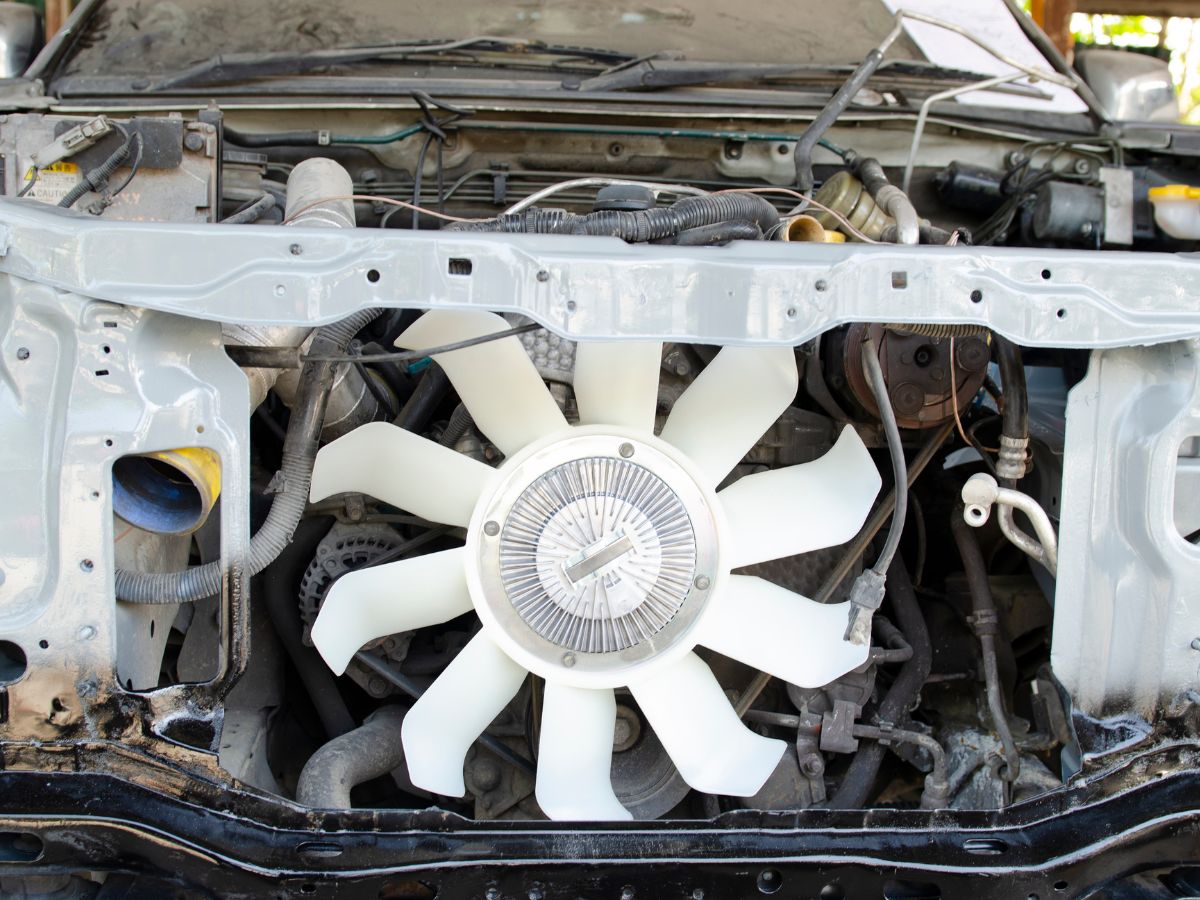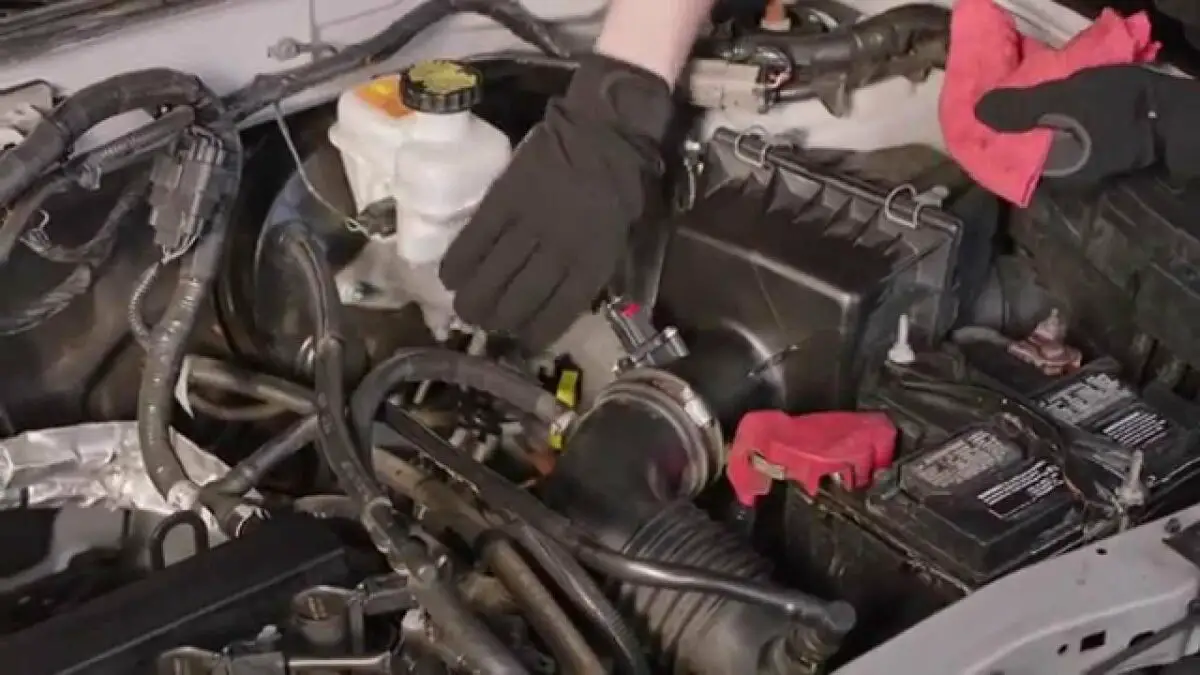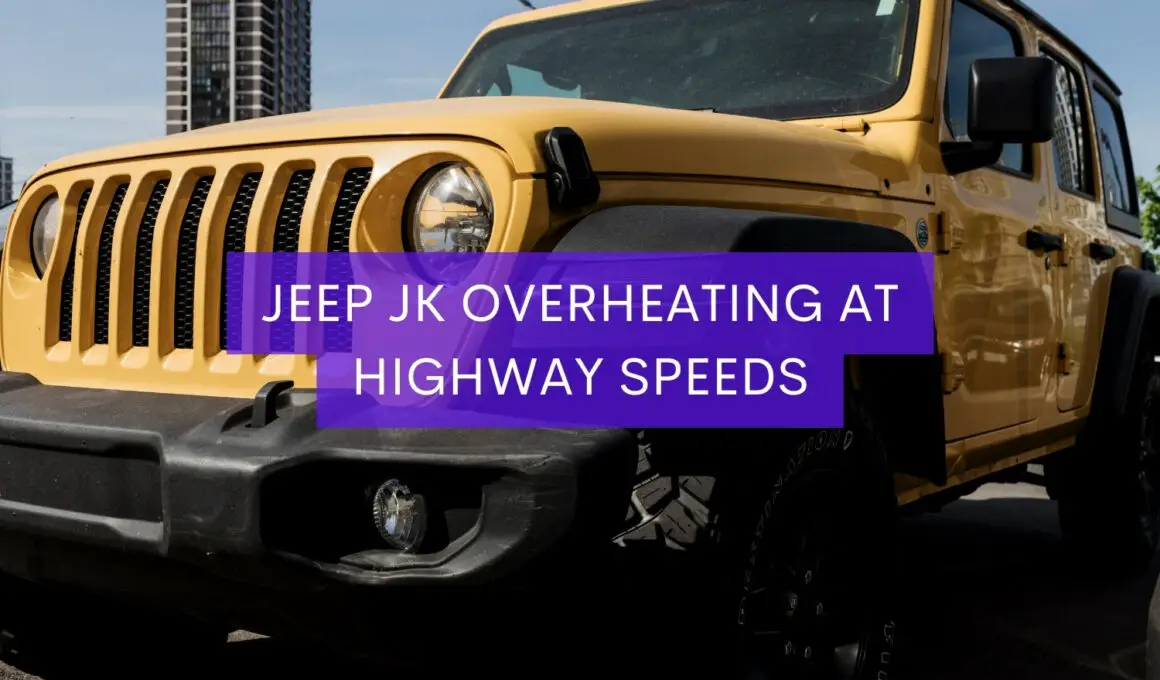In This Article Show
If you’re a Jeep JK owner, you may have experienced this problem: your vehicle starts to overheat when you’re driving at highway speeds. It’s a common issue, but it’s also one that should not be ignored. Overheating can lead to significant engine damage, and it can turn a fun road trip into a frustrating experience real quick.
As a professional mechanic and a writer of these informative blog posts, my goal has been to help car owners understand their vehicles better. By understanding the problem, you can address it more effectively and prevent it from happening in the future.
So, buckle up and join me as we dive into the causes of Jeep JK overheating at highway speeds and explore effective fixes for this issue.
Understanding Your Jeep JK’s Cooling System
The Jeep JK, like any other vehicle, relies on its cooling system to maintain optimal engine temperatures. The cooling system’s primary job is to remove excess heat from the engine to prevent overheating, especially during high-speed driving on the highway. But how does it accomplish this?
Here’s a simplified explanation of how your Jeep JK’s cooling system works:
1. Thermostat
The thermostat is a small, but crucial component that controls coolant flow based on engine temperature. When the engine is cold, the thermostat stays closed, allowing the engine to warm up quickly. Once the engine reaches its optimal temperature, the thermostat opens to allow coolant to flow.
2. Water Pump
This component circulates the coolant. Driven by the engine’s serpentine belt, the water pump sends coolant from the radiator into the engine, and then back to the radiator.
3. Radiator
The radiator cools the heated coolant coming from the engine. As you drive, outside air flows through the radiator, carrying away the heat from the coolant.
4. Cooling Fans
These fans draw in extra air through the radiator when your vehicle is stationary or moving at low speeds, helping to cool the coolant when natural airflow isn’t enough.

5. Coolant
This fluid absorbs heat from the engine and carries it to the radiator where it is dispersed. It’s important to use the correct type of coolant for your Jeep JK and to keep it at the proper levels.
6. Heater Core
Acting as a secondary radiator, the heater core provides a key role in dissipating heat when you turn on your vehicle’s heater.
At highway speeds, your Jeep JK’s cooling system works hard to keep engine temperatures under control. More heat is generated with the higher engine RPMs, and efficient cooling becomes more critical. Understanding this system is the first step to diagnosing issues that may cause overheating.
Common Causes of Overheating at Highway Speeds
While Jeep JKs are robust and well-designed vehicles, like any mechanical system, they can still face issues. Overheating at highway speeds is one such issue. Several underlying causes could lead to this problem. Let’s explore the most common ones:
1. Radiator Issues
The radiator plays a crucial role in cooling down the coolant that circulates through your engine. If the radiator is clogged or damaged, it might not be able to cool the coolant effectively, leading to overheating. Additionally, a failing radiator cap can cause a loss of coolant or decrease its boiling point, also contributing to overheating.

2. Faulty Thermostat
The thermostat regulates the flow of coolant based on the engine’s temperature. If the thermostat is stuck closed, the coolant won’t circulate, causing the engine to overheat.
3. Water Pump Failure
The water pump ensures that coolant is continuously flowing through the system. A failing water pump could result in poor coolant circulation, causing the engine to overheat.
4. Insufficient Coolant
Coolant absorbs heat from the engine and releases it in the radiator. If there’s not enough coolant in the system, or if it’s old and needs replacing, it might not be able to absorb enough heat, leading to overheating.
5. Cooling Fan Malfunction
The cooling fans draw in extra air through the radiator when the Jeep is stationary or moving at low speeds. If the fans aren’t working correctly, the radiator might not be able to cool the coolant enough, leading to overheating, especially during slower drives or idle periods.
6. Blocked Coolant Passages
Over time, rust and debris can accumulate inside the coolant passages, restricting the flow of coolant. This blockage can prevent the cooling system from working effectively, causing the engine to overheat.
Each of these issues could make your Jeep JK overheat at highway speeds.
How to Diagnose Overheating Issues in a Jeep JK
Understanding the possible causes of overheating is half the battle; the next step is learning how to identify these issues in your own vehicle. Here’s a step-by-step guide to diagnosing common causes of overheating in a Jeep JK:
1. Check the Coolant Level
First things first, ensure your coolant is at the right level. Open the coolant reservoir (make sure the engine is cool) and check if it’s filled to the appropriate line. Also, look for any signs of leaks around the reservoir and the radiator.

2. Inspect the Radiator
Look for visible damage, like cracks or leaks. Also, check for debris or dirt that might be blocking airflow. Keep an eye out for any discoloration in the coolant, which could indicate a clogged radiator.
3. Test the Thermostat
One way to test the thermostat is to touch the radiator hose once your engine has warmed up. If the hose is cold, the thermostat is stuck closed, preventing coolant from circulating.
4. Assess the Water Pump
Listen for any unusual noises while the engine is running. A failing water pump often makes a whining or grinding noise. Also, check around the pump for any coolant leaks.
5. Check the Cooling Fans
With the engine running, observe if the fans turn on when the engine starts to heat up. If they don’t, there might be a problem with the fan control, the fans themselves, or the temperature sensor.
6. Observe Coolant Passages
This one might be a bit difficult to do at home, but if you’re comfortable, you can check for rust in the coolant (a sign of blockage) when you drain and replace your coolant.
Remember, these are simple tests that you can perform at home. They’re designed to help you identify an obvious problem. However, some issues might require more advanced diagnostic tools and skills.
Solutions for Jeep JK Overheating at Highway Speeds
Once you’ve identified the cause of your Jeep JK’s overheating problem, you can move onto addressing the issue. Here are some solutions for the common causes we discussed:
1. Fixing Radiator Issues
If your radiator is clogged, a professional coolant flush might be required to remove the blockage. A radiator replacement is often the best solution for leaks or physical damage. And if the radiator cap is faulty, it’s a simple and inexpensive fix to replace it.
2. Replacing a Faulty Thermostat
A thermostat that’s stuck closed will need to be replaced. It’s affordable, but accessing it can be tricky on some vehicles, so you might want a professional to handle this job.
3. Addressing Water Pump Failure
If the pump makes noise or leaks, it will likely need replacement. This is typically a job for a professional mechanic, as it involves accessing the engine’s timing belt or chain.
4. Refilling or Replacing Coolant
If the coolant level is low, you should refill it to the appropriate level. Doing a complete coolant flush and replacement is a good idea if the coolant is old. Always ensure to use the type of coolant recommended by Jeep for your specific model.
5. Repairing or Replacing Cooling Fans
If the fans aren’t working correctly, the motor, relay, or temperature sensor might need to be replaced. Depending on the specific issue, this could be a job that you can handle at home or you might want to bring it to a mechanic.
Pro Tip 👋
Need to talk to a professional with a special discovery on your car issue? Use this link to talk to a professional. This is in partnership with JustAnswer, which has an on-call expert who can help you, especially during an emergency. Talk to a master mechanic now.
6. Clearing Blocked Coolant Passages
This problem usually requires a professional coolant system flush. If rust is an ongoing issue, you might want your mechanic to investigate the cause to prevent further problems.
Each solution corresponds to the potential causes of overheating at highway speeds. Systematically diagnosing and addressing these issues can help keep your Jeep JK running cool, even during high-speed driving.
Preventive Measures for Jeep Wrangler Overheating While Driving
Preventing overheating issues is always better than having to fix them. Here are some proactive steps you can take to keep your Jeep JK cool, especially at highway speeds:
1. Regular Coolant Checks
Regularly check your coolant level regularly and top it off as necessary. A coolant flush and replacement should also be part of your regular maintenance schedule. Always use the type of coolant recommended by Jeep for your vehicle.
2. Regular Radiator Inspection
Routinely inspect your radiator for physical damage, leaks, and blockages. Ensuring that the radiator is in good condition will help it effectively cool the engine.
3. Thermostat Checks
If your engine takes a long time to warm up or overheats quickly, your thermostat might fail. Replacing a faulty thermostat is cheaper and easier before it causes an overheating problem.
4. Water Pump Maintenance
Listen for changes in your vehicle’s sounds. If you hear a whining or grinding noise from the water pump, it’s best to get it replaced before it fails completely.
5. Cooling Fan Checks
Regularly verify that your cooling fans are working. They should kick in when your engine heats up, especially if you’re idling or moving at low speeds.
6. Regularly Scheduled Maintenance
Most importantly, keep up with your Jeep’s scheduled maintenance. Regular oil changes, belt checks, and other maintenance tasks can help prevent overheating and other issues.
Remember, prevention is the key to a long-lasting and reliable vehicle. You can enjoy those highway drives without worrying about overheating by staying proactive and keeping up with your vehicle’s needs.
Pro Tip 👋
Need to talk to a professional with a special discovery on your car issue? Use this link to talk to a professional. This is in partnership with JustAnswer, which has an on-call expert who can help you, especially during an emergency. Talk to a master mechanic now.
When to Talk to a Professional
While there are many overheating issues you can diagnose and fix at home, there are times when it’s best to consult a professional mechanic. Here’s when you should seek professional help:
1. Persistent Overheating
If your Jeep JK continues to overheat despite your best efforts, it’s time to bring it to a professional. There could be a more complex issue at hand, like a problem with the head gasket or the engine itself.
2. Inaccessible Parts
If the problem lies in a hard-to-reach part, like the water pump, you might be better off letting a professional handle the job. They have the right tools and expertise to replace these components without causing additional damage.
3. Complex Diagnostics
If you’ve checked all the common causes and can’t find the issue, a mechanic can diagnose more in-depth. They have specialized tools and knowledge to pinpoint the cause of the problem accurately.
4. Regular Maintenance
Even if your Jeep JK isn’t currently overheating, regular professional maintenance can help prevent future issues. A mechanic can spot early signs of potential problems and fix them before they cause significant damage.
Remember, while DIY fixes can be satisfying and cost-effective, there’s no substitute for professional training and experience. Don’t hesitate to bring your vehicle to a professional if you’re unsure about anything – it’s always better to be safe than sorry.
Pro Tip 👋
Need to talk to a professional with a special discovery on your car issue? Use this link to talk to a professional. This is in partnership with JustAnswer, which has an on-call expert who can help you, especially during an emergency. Talk to a master mechanic now.
Conclusion
Overheating at highway speeds can be distressing for any Jeep JK owner. However, understanding the workings of your vehicle’s cooling system, knowing the common causes, and learning how to diagnose the problem puts you in a stronger position to address this issue.
You now have the knowledge to potentially diagnose and fix the issue yourself or, in more complicated scenarios, know when it’s time to take your Jeep JK to a professional mechanic.
Regular preventive measures and maintenance are also crucial in ensuring your vehicle runs smoothly and remains cool, even at high speeds.











